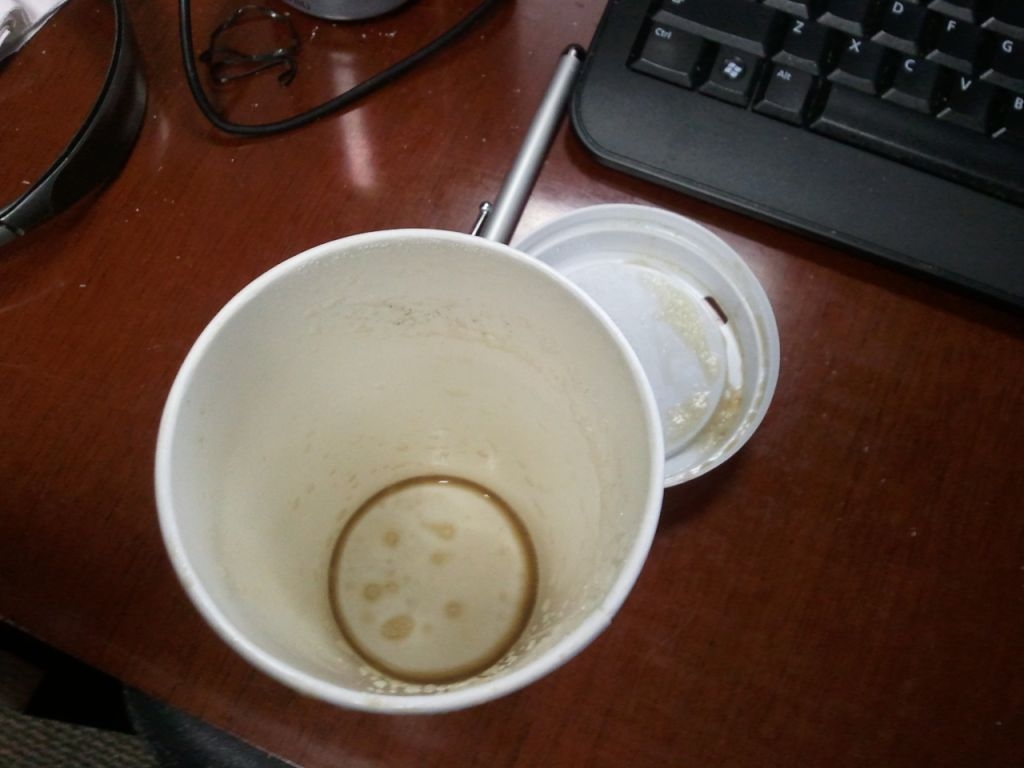
I love coffee. More accurately, I love vanilla soy lattes with an extra shot of espresso
(and usually extra vanilla).
I pass two different coffee shops on my way to/from work every day. One is a lovely independent joint called Burlap & Bean. The other is a Starbucks. (Used to pass three, but then the Saxby’s turned into a Verizon Store. And really, there are two more – the coffee bar in Wegmans, and another Starbucks in Target – but they require a short-but-awkward detour from my commute, so they don’t count.)
For some reason, no matter where you caffinate, lattes are ridiculously overpriced, and there are surely wiser ways to spend my money, but they just make me happy – the perfect balance of espresso and foamy faux-milk and vanilla sweetness just makes mornings feel a little less morning-y – and driving right by them every day… and since it’s usually just my boss and I in the office, stopping for coffee is often the most human interaction I’ll get all day – plus, if you use a registered Starbucks card, they give you soy and flavored syrups for free, so I end up stopping most days.
But yesterday, I saw an email from Starbucks.
It starts out all nice and cheery – when you earn a free drink, instead of sending a postcard you have to bring in, they’re going to put it right on your Starbucks card now, and it’ll also be good for food if you’d prefer, and you get a freebie every 12 drinks instead of 15!
Cool.
Except keep reading, and you get to this:

O_O
Well… Starbucks, I’ll miss you…
But if you think I’ll sit idly by while you effectively jack the price up on my coffee by $1.10 a cup, you’ve got another thing coming. (Hint: It isn’t me, into your store.)
- Yes, I could skip the vanilla, or find a cheaper drink.
- Yes, I could just drink the office coffee slightly more often.
- Yes, the other coffee shops charge just as much.
(And I probably will do both of those.)
But the thing is, that $1.10 difference was the factor that won you my near-exclusive patronage, and dare I say, even loyalty. But without that, you’re just another coffee shop. And frankly, your the big, corporate, international, chain coffee shop (with almost 20,000 stores) – versus the little local, one-of-a-kind, independent Burlap & Bean (and even the regional, one-of-90-stores, not-a-cafe-but-has-one Wegmans). All else being equal, I’d rather support the little guys. And guess what? You just made all else pretty much equal.
So, I’ll miss you, Starbucks.
I’ll miss the perfect – reliably perfect – deliciousness of your triple grande vanilla soy lattes.
I’ll miss the very fun and friendly baristas at the Starbucks location I frequent, who know my name and my drink and give me movie recommendations.
I’ll even miss being able to pay for my coffee with a barcode on my cellphone.
But it will be nice to shift more of my support to a local business, not have to deal with that god-awful parking lot of yours, and get my coffee 15 minutes sooner (on the now-less-common days I do stop for coffee) since I pass Burlap & Bean earlier on my commute.
Sure, I’ll stop by sometimes, especially as iced coffee season rolls around (assuming you don’t take the free soy away from that too), but not nearly as often as I have been. You’re giving up your advantage, and losing a regular. I don’t expect you’ll care, but I also don’t expect that I’m the only lactose-intolerant and/or flavored-coffee-loving customer whose business you’ll be largely losing, so thought I’d at least let you know.
Any time you want to reconsider, I’ll come gleefully running back, but until then, you’re just another coffee shop – competing on slightly-less-than-equal footing at that.
*sigh*
PS: ATTENTION ALL COFFEE SHOPS! Charging for soy milk (unless you offer some other lactose-free “milk”), just seems kind of mean… like a tax on people with faulty digestive tracts. =(
